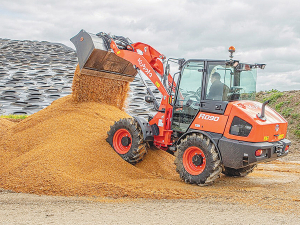Carrfields expands South Island footprint with Agricentre South Kubota dealership acquisition
Two of the South Island’s agricultural machinery dealers are undertaking strategic changes designed to deliver even greater specialist support to farmers.
 Kubota has announced that its new tractors are suited to running on hydrotreated vegetable oil (HVO).
Kubota has announced that its new tractors are suited to running on hydrotreated vegetable oil (HVO).
While we have become accustomed to vehicle manufacturers offering alternative fuel sources for its ranges, other than New Holland with its commercially available T6 Methane tractors, the agricultural landscape is firmly fixated on diesel power.
With the realisation that current battery technology does not lend itself to agricultural situations, tractor manufacturers have looked a little more closely at alternative fuels to power their compression ignition (CI) engines. Kubota is the latest to announce that its new tractors are suited to running on hydrotreated vegetable oil (HVO).
The company has also confirmed that it is possible for its new dieselengine tractors to run on both HVO and GTL (gas to liquid) which will contribute to a lower carbon footprint for Kubota IC engines.
As a manufacturer of industrial engines, tractors, grounds care and construction equipment, Kubota has realised that HVO, which is synthesised from vegetable oil and fat, is likely to become increasingly popular due to its environmental benefits. GTL meanwhile is synthesised from natural gas, therefore its contribution to reducing total carbon emissions is somewhat reduced.
Having undergone extensive trials to evaluate any effect on the performance and achieving a clean bill of health, Kubota has confirmed that that any paraffinic fuel that complies with the European standard EN15940 is suitable for use across its range of diesel engines. The company also notes that there is no need to flush fuel tanks or change filters, as HVO and GTL, meeting the EU standard, are safe to mix with common diesel.
There are changes to existing maintenance intervals or warranty conditions when using these fuels, although operators may notice a slight degradation in engine performance when using them due to the lower energy density of paraffinic fuels, compared to diesel.
Agriculture and Forestry Minister Todd McClay is encouraging farmers and growers to stay up to date with weather warnings and seek support should they need it.
The closure of SH2 Waioweka Gorge could result in significant delays and additional costs for freight customers around the Upper North Island, says Transporting New Zealand.
OPINION: The year has started positively for New Zealand dairy farmers and things are likely to get better.
Ministry for Primary Industries (MPI) Director General Ray Smith believes there is potential for an increase in dairy farming in New Zealand.
New Zealand's new Special Agricultural Trade Envoy, Horowhenua dairy farmer, company director and former Minister of Agriculture, Nathan Guy says the Free Trade Agreement (FTA) with India is a good deal for the country.
New figures show dairy farmers are not only holding on to their international workforce, but are also supporting those staff to step into higher-skilled roles on farm.